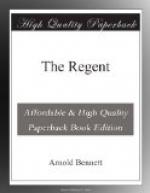“No, I’m not,” she said stoutly, trying to smile.
But he knew she was. And he knew also that the bite was a trifle. If it had been a good bite she would have made it enormous; she would have hinted that the dog had left a chasm in the boy’s flesh.
“Yes, you are,” he continued to twit her, encouraged by her attempt at a smile.
However, the smile expired.
“I suppose you won’t deny that Carlo’s teeth may have been dirty? He’s always nosing in some filth or other,” she said challengingly, in a measured tone of sagacity. “And there may be blood-poisoning.”
“Blood fiddlesticks!” exclaimed Edward Henry.
Such a nonsensical and infantile rejoinder deserved no answer, and it received none. Shortly afterwards Maud entered and whispered that Nellie was wanted upstairs. As soon as his wife had gone Edward Henry rang the bell.
“Maud,” he said, “bring me the Signal out of my left-hand overcoat pocket.”
And he defiantly finished his meal at leisure, with the news of the day propped up against the flower-pot, which he had set before him instead of the dish of ham.
III
Later, catching through the open door fragments of a conversation on the stairs which indicated that his mother was at last coming down for tea, he sped like a threatened delinquent into the drawing-room. He had no wish to encounter his mother, though that woman usually said little.
The drawing-room, after the bathroom, was Edward Henry’s favourite district in the home. Since he could not spend the whole of his time in the bathroom—and he could not!—he wisely gave a special care to the drawing-room, and he loved it as one always loves that upon which one has bestowed benefits. He was proud of the drawing-room, and he had the right to be. The principal object in it, at night, was the electric chandelier, which would have been adequate for a lighthouse. Edward Henry’s eyes were not what they used to be; and the minor advertisements in the Signal—which constituted his sole evening perusals—often lacked legibility. Edward Henry sincerely believed in light and heat; he was almost the only person in the Five Towns who did. In the Five Towns people have fires in their grates—not to warm the room, but to make the room bright. Seemingly they use their pride to keep themselves warm. At any rate, whenever Edward Henry talked to them of radiators, they would sternly reply that a radiator did not and could not brighten a room. Edward Henry had made the great discovery that an efficient chandelier will brighten a room better even than a fire, and he had gilded his radiator. The notion of gilding the radiator was not his own; he had seen a gilded radiator in the newest hotel at Birmingham, and had rejoiced as some peculiar souls rejoice when they meet a fine line in a new poem. (In concession to popular prejudice




